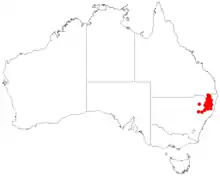Leptospermum gregarium
Leptospermum gregarium is a species of shrub that is endemic to eastern Australia. Its young stems are hairy the leaves are egg-shaped to lance-shaped with the narrower end towards the base, the flowers are white and arranged singly or in pairs on short side branches and the fruit remain on the plant at maturity. It usually grows in dense stands in swamps or along rocky creeks in high altitude place in northern New South Wales and south-eastern Queensland.
| Leptospermum gregarium | |
|---|---|
| Scientific classification | |
| Kingdom: | Plantae |
| Clade: | Tracheophytes |
| Clade: | Angiosperms |
| Clade: | Eudicots |
| Clade: | Rosids |
| Order: | Myrtales |
| Family: | Myrtaceae |
| Genus: | Leptospermum |
| Species: | L. gregarium |
| Binomial name | |
| Leptospermum gregarium | |
 | |
| Occurrence data from AVH | |
Description
Leptospermum gregarium is a shrub that typically grows to a height of about 2 m (6 ft 7 in). Older stems have bark that is shed in strips or small flakes and younger stems are covered with fine hairs. The leaves are broadly egg-shaped to lance-shaped with the narrower end towards the base, mostly 5–10 mm (0.20–0.39 in) long and 2.5–4 mm (0.098–0.157 in) wide but sometimes longer. The flowers are white and are borne singly or in pairs on short side branches, and are less than 10 mm (0.39 in) in diameter. The floral cup is hairy, about 3 mm (0.12 in) long on very short pedicel. The sepals are triangular to more or less round, 1.5–2 mm (0.059–0.079 in) long, the petals about 3–4 mm (0.12–0.16 in) long and the stamens 1.5–2 mm (0.059–0.079 in) long. Flowering mainly occurs from November to December and the fruit is a capsule mostly 5–6 mm (0.20–0.24 in) in diameter and remain on the plant at maturity.[2][3]
Taxonomy
Leptospermum gregarium was first formally described in 1989 by Joy Thompson in the journal Telopea, based on plant material collected from 10 km (6.2 mi) from Ebor on the road to Guyra in 1981.[2][4] The specific epithet (gregarium) refers to the tendency of this species to grow in dense stands.[2]
Distribution and habitat
Leptospermum gregarium grows in swamps and along rocky creeks in high altitude areas of New South Wales north from Nundle and of the Granite Belt in south-east Queensland.[3][2]
References
- "Leptospermum gregarium". Australian Plant Census. Retrieved 5 April 2020.
- Thompson, Joy (1989). "A revision of the genus Leptospermum (Myrtaceae)". Telopea. 3 (3): 411–412.
- "Leptospermum gregarium". Royal Botanic Garden Sydney. Retrieved 5 April 2020.
- "Leptospermum gregarium". APNI. Retrieved 5 April 2020.